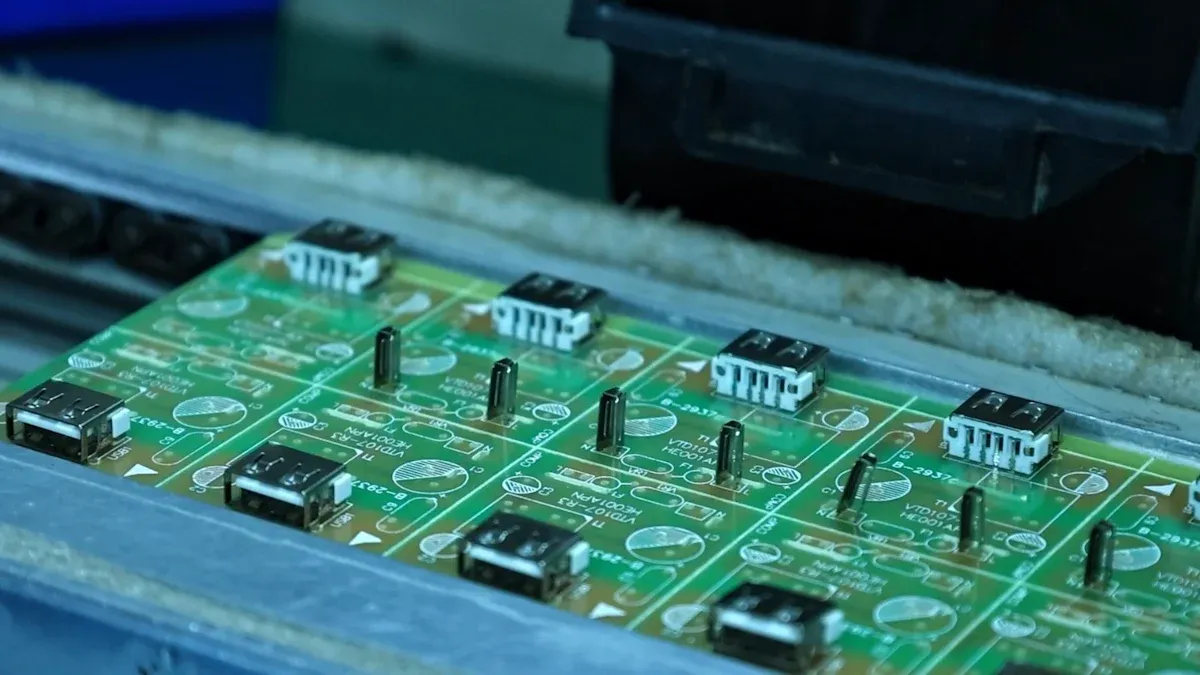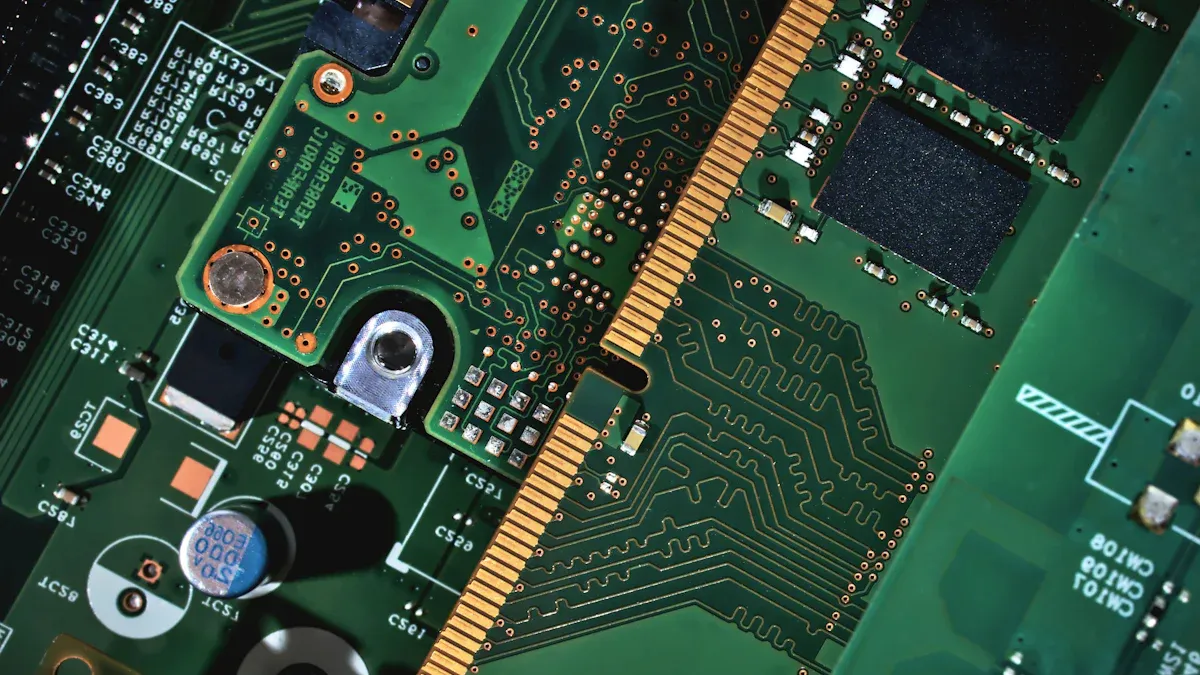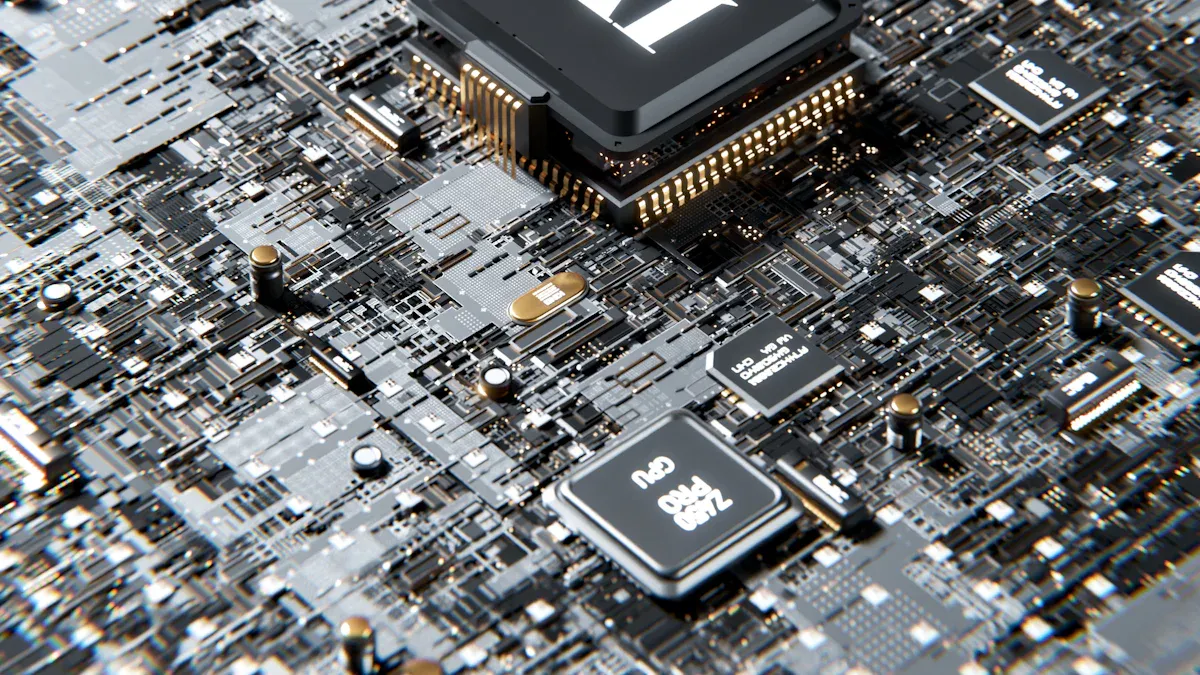Domestic vs. International Turnkey PCBA Manufacturing Suppliers for Your Project

Should you pick a domestic or international turnkey supplier for your project? Your choice affects how much your project costs. It also changes how fast and how well it gets done. The market is getting bigger. Turnkey PCBA Manufacturing is wanted all over the world. There is more advanced automation now. Where your supplier is located can change your project’s risk. It also affects how you talk to them. It can change if you meet tough quality rules.
Key Takeaways
Picking between domestic and international turnkey PCBA suppliers changes your project's price, speed, and quality.
Domestic suppliers can deliver faster, talk with you more easily, and check quality well, but they often cost more.
International suppliers charge less, use new technology, and can make many products at once, but they might have problems with talking to you and shipping.
Turnkey PCBA Manufacturing
What Is Turnkey?
You might hear the word turnkey a lot in electronics. Turnkey means you give your whole pcb project to one supplier. This supplier does everything for you. They buy the electronic parts, make the pcb, put it together, and test it. Turnkey pcb assembly includes design, making, and checking for quality. You do not have to talk to many vendors. This makes talking easier and helps stop mistakes. Turnkey pcb manufacturing lets you get your product out faster. Many companies pick turnkey pcb assembly to save time and money. Industry rules like ISO 9001:2015 and IPC help keep quality high. Suppliers check every board by looking and using machines. Turnkey pcb assembly gives you one person to talk to for your whole project.
Why Location Matters
Location is very important in turnkey pcba manufacturing. Where your turnkey pcb assembly supplier is changes cost, speed, and risk. Domestic turnkey pcb manufacturing is faster and easier to talk to. You can go to the factory and see the quality yourself. Offshore turnkey pcb assembly, often in Asia-Pacific, can be cheaper because they make more at once. But shipping takes longer and customs can slow things down. The table below shows how location changes important parts of turnkey pcba manufacturing:
Factor | Domestic Turnkey PCB Assembly | Offshore Turnkey PCB Assembly |
|---|---|---|
Lead Time | Shorter, faster delivery | Longer, shipping and customs delays |
Communication | Easier, same time zone | Time zone and language challenges |
Logistics | Simple, local shipping | Complex, international shipping |
Cost | Higher unit cost | Lower unit cost |
Quality Control | Easier on-site checks | Remote audits, strict QA needed |
IP Protection | Strong legal safeguards | Varies by country |
Turnkey pcba manufacturing is getting bigger every year. The world market could be $15 billion by 2025, with Asia-Pacific making the most. Turnkey pcb assembly suppliers use new machines and AI to make things better and faster. You should think about location when picking a turnkey pcb manufacturing partner for your next electronics project.
Domestic Sourcing

Pros of Domestic Suppliers
Picking domestic sourcing for turnkey pcb assembly gives you many good things. It is easier to talk with your local pcb contract manufacturer. You both use the same language and time zone. This helps you get answers fast and keeps you updated. You can also visit the factory in person. This lets you check the pcb quality and see the whole turnkey process.
You get your orders faster with shorter lead times. Domestic manufacturers use smart systems like ERP and MES. These track every step of making your pcb. You can see updates on your turnkey pcb assembly orders right away. These systems help keep parts ready and work moving. Many domestic suppliers use two sources and extra stock to avoid delays.
Quality control is a big plus. Domestic turnkey pcb assembly makers follow strict rules like ISO 9001 and IPC. They use machines to check for problems early. You can trace every part in your pcb. This means you know where each part came from and how it was checked. Many domestic makers use 143 checks at each stage. This is three times more than most. This leads to a 99.97% first-pass yield rate and stops most mistakes.
Customer service is also very strong. You get help any time and quick replies. Domestic suppliers let you order small or big batches. You can start small and grow as needed. You do not pay hidden costs like customs fees or long shipping. Local pcb contract manufacturers are open and give personal help. This makes fixing problems easier.
Tip: If your project needs strong IP protection, domestic sourcing gives you good legal safety and easy contract rules.
Here is a table that shows how domestic turnkey pcb assembly suppliers handle lead time and quality:
Aspect | Strategy/Benefit |
|---|---|
Lead Time Management | Real-time tracking, dual sourcing, safety stock, AI forecasting, flexible manufacturing |
Quality Control | IQC, AOI, X-ray, MES tracking, full traceability, strict standards |
Supply Chain Visibility | End-to-end transparency, barcode/RFID tracking, intelligent warehousing |
Cons of Domestic Suppliers
Domestic sourcing for turnkey pcb assembly has some problems too. You might pay more. Domestic makers have higher setup and running costs. Small runs cost more per pcb because local pcb contract manufacturers cannot make as many as big overseas factories. If you order a small batch, each pcb costs more.
Material prices can go up too. Things like copper foil, glass fiber, and epoxy resin cost more now. This is because more people want them and there are shortages. These costs add up for domestic makers. Tariffs and strict rules can make prices even higher. You might see a 4-7% cost jump for consumer electronics.
Making lots of pcbs at once can be hard. Domestic makers may not have as much space as international suppliers. If you need a lot of turnkey pcb assembly, you may not find many local options. Small companies also pay more for parts because they buy less from component manufacturers.
You should also know that shipping costs can go up if your suppliers are far apart. If you get pcb, pcba, and final assembly from different places, shipping costs more. Domestic suppliers sometimes pay more for workers and face rules that slow down new ideas and growth.
Here is a list of common problems with domestic sourcing for turnkey pcb assembly:
Higher costs for small runs
More expensive materials and labor
Not as many savings as international makers
Tariffs and rule costs
Small orders for parts mean higher prices
Shipping costs go up with spread-out suppliers
Choosing domestic sourcing for turnkey pcb assembly gives you good quality, fast talking, and strong customer help. But you need to think about the higher costs and smaller scale. Look at what your project needs before you decide.
International Sourcing

Pros of International Suppliers
International sourcing lets you pick from many manufacturers. You can find suppliers with new technology and big factories. Many international suppliers, especially in Asia-Pacific, offer lower prices. They save money by making lots of products at once. You also get better prices when you buy parts in bulk.
Overseas turnkey pcb manufacturing uses the newest machines. These include automated optical inspection and laser drilling. These tools help make better products and waste less. International suppliers can handle hard pcb designs and big orders. You can grow your project fast without much extra work. Global supply chains help you get parts quickly and save money.
Here is a table that compares international turnkey pcb assembly suppliers to traditional separated processes:
Aspect | Turnkey PCBA Supplier Benefits (TechInnovate Case) | Traditional Separated Processes Challenges |
|---|---|---|
Lead Time | Longer lead times due to multiple vendors and handoffs | |
Cost Savings | 23% reduction in overall production costs due to economies of scale | Higher costs from shipping, rework, and vendor management |
Quality | Defect rate decreased from 3.5% to <0.5% | Inconsistent quality across batches |
Scalability | Production capacity increased by 300% without extra management | Difficult to scale efficiently |
Time-to-Market | New product variations launched 40% faster | Slower due to fragmented processes |
You get many good things with international sourcing:
Lower labor costs and strong supply chains in China and other places
New technology for high-quality pcb manufacturing
Bulk orders from component manufacturers for better prices
Fast turnkey pcb assembly that saves time
Global reach helps you grow your project quickly
The pcb assembly and manufacturing market is growing fast. It is worth over $34 billion in 2024 and could reach $61 billion by 2033. This growth comes from more people wanting electronics, cars, healthcare, and telecom. International suppliers use automation, AI, and machine learning to make things better and faster. You get quicker production, fewer mistakes, and better cost control.
Cons of International Suppliers
International sourcing for turnkey pcb assembly has some problems too. You may have trouble talking because of language and time zones. These problems can slow your project and make fixing issues harder. It is tough to visit factories or check quality yourself. You must use remote audits and strict rules to watch your project.
Cultural differences can make trust and teamwork harder. Studies show that cultural distance means you need stricter contracts and checks. You may need more detailed agreements to protect your project and get things on time. Shipping and customs can be tricky with international orders. Delays in shipping or customs can slow down your project.
Here are some common problems with international sourcing:
Trouble talking because of language and time zones
Harder to check quality and progress from far away
Need for strict rules and detailed contracts
Complicated shipping and customs steps
More risk of delays in shipping and delivery
You need to balance these risks with the good things like lower costs and bigger factories. Many companies use both strict rules and trust to work with international suppliers.
LTPCBA and Turnkey PCB Manufacturing
LTPCBA is a top turnkey pcb assembly maker in Shenzhen, China. You get new technology, smart systems, and a skilled team. LTPCBA gives you high-quality pcb manufacturing that meets top standards. The company uses automated optical inspection, IoT monitoring, and AI to check for problems and work better.
You get fast help from LTPCBA, with quotes in 2-3 days and 24-hour support. The company delivers on time more than 98% of the time, and its first pass yield is up to 98%. LTPCBA’s process makes lead times 60% shorter and cuts mistakes by 86%. You can trust them with hard pcb projects, from samples to mid-size runs.
Here is a table showing LTPCBA’s performance:
Performance Metric | Documented Range / Impact |
|---|---|
Customer Satisfaction Score | Between 70% and 90%, with excellent scores above 80% |
On-Time Delivery Rate | Ranges from 90% to 95%, with top performers exceeding 98% |
First Pass Yield (FPY) | Between 95% and 98% |
Scrap Rate | Below 5%, sometimes as low as 2% |
Defects Per Million Opportunities (DPMO) | Between 500 and 1000 |
Lead Time Reduction | Full turnkey manufacturing cuts lead times by 60% |
Defect Reduction | Defects reduced by 86% through turnkey processes |
Production Capacity Increase | Boosted by 300% due to process improvements |
LTPCBA’s global reach and focus on quality make it a strong partner for your project. You can count on their turnkey pcb assembly services for small or big orders. Their focus on new ideas, customer happiness, and high standards makes them stand out among international suppliers.
Comparison Table
When you pick a turnkey supplier for your pcb project, you should look at both domestic and international choices. Each type of turnkey pcb assembly sourcing has its own good and bad points. The table below shows the main ways they are different. It compares cost, lead time, quality, communication, risk, and supply chain strength.
Factor | Domestic Turnkey PCB Assembly | International Turnkey PCB Assembly |
|---|---|---|
Cost | Higher unit cost, less savings on large runs | Lower unit cost, strong savings at scale |
Lead Time | Shorter, faster delivery | Longer, shipping and customs add time |
Quality | Easier on-site checks, strict standards | Advanced technology, high quality, remote QA |
Communication | Same time zone, fast response | Time zone and language barriers |
Risk | Strong IP protection, stable regulations | More risk from distance and global events |
Supply Chain Resilience | Local sourcing, quick issue resolution | Diversified supply, advanced manufacturing |
Domestic turnkey pcb assembly gives you strong quality control. You can go to the factory and watch each step. International turnkey pcb assembly lets you use new machines and make lots of pcbs at once. You save money and get the latest technology. Talking is easier with domestic suppliers because you are in the same time zone. International suppliers use smart systems to lower risk and keep your project moving.
Studies show that supply chain strength gets better with more sources and new machines. Local sourcing helps you fix problems fast. International turnkey suppliers use automation and AI to spot risks and keep your pcb project safe. Good relationships with suppliers help you trust them and solve problems quickly.
Tip: Use this table to help you choose the best turnkey pcb assembly sourcing for your project. Think about what is most important for your pcb manufacturing—cost, speed, quality, or risk.
Choosing a Supplier
Project Needs
Before you pick a turnkey pcb assembly partner, write down what your project needs. Every project is different. Some need fast delivery. Others care more about quality or price. Think about how hard your pcb design is. Look at how many parts you need to fit on the board. Decide if you want a prototype, a small batch, or a big order. Check if you need special skills like SMT, through-hole, or BGA assembly. Make sure your budget matches what suppliers charge. Your supplier should meet your deadlines and get good parts from trusted sources.
Project difficulty and pcb design
How many you need and how fast
Budget and price setup
Supplier certifications and what they can do
How they check quality and inspect
Compliance and Risk
You need to think about rules and risks when picking a turnkey pcb assembly supplier. Many projects must follow rules like RoHS, REACH, or IATF 16949. The best suppliers use real-time alerts and automatic checks to keep your project safe. They use AI to find risky suppliers and steps. You can ask for BOM health reports and data to check for problems in the supply chain. Some suppliers use smart tools to spot issues early. These steps help you avoid delays and keep your pcb project moving.
Compliance Feature | Description |
|---|---|
Real-time alerts | Updates on RoHS, REACH, and IATF 16949 compliance |
Audit readiness | Automated tracking for regulatory compliance |
Risk assessment | AI tools to find high-risk suppliers and processes |
BOM health reports | Data on component lifecycle and inventory |
Predictive analytics | Early warning for quality and compliance issues |
Decision Factors
Match what matters most in your project with the right turnkey pcb assembly supplier. If you want fast delivery, easy talking, and factory visits, local suppliers may be best. If you want lower prices, new machines, and big orders, international suppliers like those in Shenzhen are a good choice. Look for quality certificates like ISO 9001 and IPC-A-610. Check if they use tools like AOI and X-ray to inspect. Review their delivery times, prices, and customer help. Ask for references and see how they did on other pcb projects.
Tip: Make a checklist to compare suppliers on quality, technology, speed, price, and support. This will help you pick the best turnkey partner for your pcb manufacturing project.
Picking a domestic or international turnkey pcb assembly supplier changes your project’s cost, speed, and quality. Here is a checklist to help you choose:
Decide what your turnkey project needs and how hard the pcb is.
Look at the quality, price, and delivery time for each turnkey pcb assembly.
Check the supplier’s data, how many defects they have, and if they keep getting better.
Make sure the turnkey supplier has the right certificates and uses real-time checks.
Think about how they handle shipping, talking with you, and keeping things safe.
Think about what matters most for your turnkey project. Using data and math tools, like chi-square analysis, can help you pick a turnkey pcb assembly partner who always gives good quality. You can ask LTPCBA for special turnkey solutions that fit your needs.
FAQ
What does turnkey mean in PCBA manufacturing?
You let one supplier do your whole project. The turnkey supplier gets the parts, puts them together, tests them, and sends them to you. This saves you time and helps stop mistakes.
Why should you choose a turnkey supplier for your project?
You only need to talk to one person. The turnkey process makes talking easier, gets your order to you faster, and helps keep quality high. You do not have to work with many different vendors.
How does turnkey sourcing affect project risk?
Turnkey sourcing makes risk lower. You trust one supplier to do every part of the job. This way, it is easier to check quality and stop problems in your project.
See Also
Choosing The Best Turnkey PCBA Manufacturer For Projects
Sourcing Electronic Parts Efficiently For PCBA Production
Finding The Ideal PCBA Supplier To Fit Your Requirements
Quality Assurance In Modern Turnkey PCBA Manufacturing Plants
Enhancing Business Efficiency Through PCBA Contract Manufacturing
